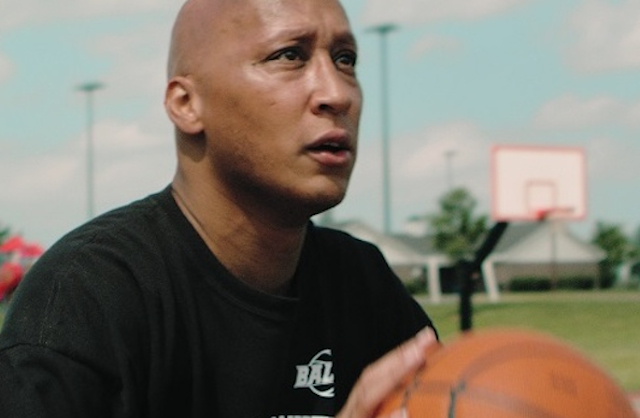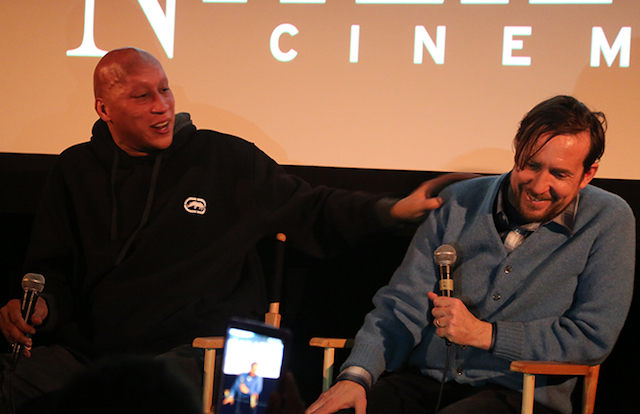CHICAGO – Patrick McDonald of HollywoodChicago.com appears on “The Morning Mess” with Dan Baker on WBGR-FM (Monroe, Wisconsin) on March 21st, 2024, reviewing the new streaming series “Manhunt” – based on the bestseller by James L. Swanson – currently streaming on Apple TV+.
Interview: Benjamin May on ‘The Legend of Swee’ Pea’ at the Midwest Independent Film Festival
CHICAGO – The road to athletic success is littered with the clichés of “might have been” and “never was,” but rarely does it contain a success story that is despite the person who achieved that success. In the early 1990s, a journeyman broke into the National Basketball Association, the first time in its history that a player that never graduated from high school made it to the big show. That man is Lloyd Daniels, and his story is in the documentary “The Legend of Swee’ Pea,” by filmmaker Benjamin May. The director will appear – with his cinematographer Daniel Levin – on behalf of his film at its Chicago premiere, presented by the Midwest Independent Film Festival on Tuesday, March 7th, 2017 (details below).

Lloyd Daniels Takes a Shot at Life in ‘The Legend of Swee’ Pea’
Photo credit: TheLegendofSweePea.com
Benjamin May hails from Minnesota, and “The Legend of Swee’ Pea” is his first film, born out of a memory of Lloyd Daniels when he was a player. Daniels was a playground legend from the roughest and poorest boroughs in New York City, and seemed to waste every opportunity given to him to exploit his basketball gifts. But somehow he always landed somewhere, all the way to the NBA. HollywoodChicago.com talked to director May about his special portrait of Daniels, the ups, downs and in betweens.
HollywoodChicago.com: What possessed you to make this film? What was the point of origin that started it the process, and helped inform you all the way to finishing the film?
Benjamin May: Lloyd Daniels was a notorious player in the late 1980s coming out of New York City, even as I came from small town Minnesota I heard of his exploits on the playgrounds there. He was a mythic figure in the basketball world, because no one had really seen him play, but he still was featured in Sports Illustrated and the New York Times – who helped to create the mythos around his ability, whether it was true or not.
When Lloyd went into the NBA around 1992 – around the time I was in college – it was like seeing a living legend manifested, like Paul Bunyan coming to life. Despite his addictions and having been shot, he was still a unique presence in the NBA, and it highlighted that sixth sense he possessed regarding the ebb and flow of a basketball game, that really made him special. That’s what interested me in the first place.
HollywoodChicago.com: How did that interest evolve into the film?
May: The thing that got the whole thing rolling was through Ben Osborne, the editor-in-chief of Slam Magazine. He was a bit skeptical of the idea, since other people had floated some film ideas about Lloyd, but he made the introductions, and it all started to happen from there. Once you know Lloyd, there is a better understanding of how the other films didn’t work out.
This is not something I say that is bad, but a lot of interaction with Lloyd have a transactional undertone. He doesn’t want to give everything away for free, he wants something out of it. I didn’t pay Lloyd per se, but I helped him out a little bit here and there. The development of the relationship with Lloyd, plus the friendship and trust, really allowed us to take it to the finish line.
HollywoodChicago.com: You included phone messages in the film that Lloyd left you throughout your relationship, and most of them had to do with asking for cash. What do you think that illustrates about Daniels the man, that is a thread throughout his whole life?
May: First off, he grew up in the poorest neighborhoods of Brooklyn and the Bronx. His mother died at a young age, and his father was never there. He was raised by two grandmothers, and he really had to fend for himself at a very young age, and that was the foundation for his behaviors. And once that he became aware that he was a basketball prodigy, he started playing that card, basically to survive.
For good or for ill, in many ways that was an Achilles Heel that affected him badly, but also it was the only currency he had. On the one hand, we can’t relate to that life at all if we had a stable upbringing, but from where Lloyd came from it’s pretty amazing what he accomplished – the NBA, he traveled around the world, made some money and raised a family. As for his personality, that’s just how he is, and I had to come to understand it when I was working with him. I accepted it, and moved beyond it.
HollywoodChicago.com: We experience a lot of people in the film who essentially semi-adopted Lloyd throughout his life – his lawyer friend, Coach Jerry Tarkanian and you – what do you believe is in his being that attracted and created these bonds?
May: Those were key people, and most people who I encountered that knew him had the same deep feeling for him. He has a very good heart, he’s very emotional and deeply human. It’s really on the surface for him, more than I had ever experienced in another person. He never holds grudges, when he has something he’s very generous and he’s incredibly nice to kids. He’s just very likable, and despite having problems in school he’s very verbal.
So you get a taste of that, but you also can get the side where his addictions are, and it becomes a situation where you love him, but you have to get away for awhile. That’s why he has problems with lasting relationships…people just need to take a break from him.
HollywoodChicago.com: To be an elite athlete, there is a certain discipline and drive that eventually overrides everything else. We would assume that Lloyd Daniels had this drive, but what about that drive also had the power to destroy him?
May: He lived with a sense of invincibility, so he never supplemented his innate basketball gifts with hard training. He never honed those skills to the elite level of the NBA. Even when he was entrenched as a pro, he relied on the innate abilities rather than hard work. He used those talents essentially to see the world, party, meet people and have a good time.
One of his flaws was a lack of foresight, the lack of an understanding that if you invest in something now, it will pay off in the future. He always represented getting something right now. Combined that with his addiction issues, and that’s what brought him down.

Lloyd Daniels with Filmmaker Benjamin May at a Recent Screening of ‘The Legend of Swee’ Pea’
Photo credit: TheLegendofSweePea.com
HollywoodChicago.com: Since you go inside the street game and the African American tradition of using sports as a way out of their circumstances, what about that tradition do you think white people in general can never understand?
May: I think something that really illustrates this wide cultural divide between black and white is where Lloyd Daniels came from…those families in the Bronx and Brooklyn. For those relatives, his story is an amazing success. He left the neighborhood, played in the NBA, and lived all over the world. He met celebrities, he traveled on a plane and stayed in 5-star hotels. He did all those things, and people from economically disadvantaged areas – which can be heavily African American – think those things are not even obtainable.
But for a white person from middle class or upper middle class and stable family roots, Lloyd’s story was one of deep tragedy and unfulfilled abilities. To them, yes, he made the NBA, but in the establishment’s eye, it was with diminished skills, and he was a shadow of what he once was.
HollywoodChicago.com: Your use of archival footage was amazing. Which piece of Lloyd Daniels’ career was the rarest find, and do all NBA teams have archives that include the pristine footage from the 1990s that you found?
May: It was really great to work with the NBA, especially since we were a pretty small budgeted feature. The way that it worked is that the league has a group of people that work in their archival department. When I contacted them, and asked for what I wanted, they had their people go through it and they sent me about 16 minutes of footage that was just Lloyd. That saved a lot of time, and was really great.
The rarest find was a high school game of Lloyd’s, that was in the archives at NBC-TV in New York. I just had to get permission to use it. It was a full game, and there was very little of him just growing up, so it was a rare find.
HollywoodChicago.com: The documentary as a cinematic art form has gone through a lot of changes in the digital age, like everything else. What do you think you were able to do with ‘The Legend of Swee’ Pea’ that a documentary from the 1960s and ‘70s may have not been able to do?
May: Well, now it’s a double edged sword. Because content is easier to do in the digital age, there is so much more of it. There are thousands of documentaries made every year now, so it’s pretty hard to stand out. If you made a doc in the 1960s and ‘70s as you mentioned, and it was on the same subject, it’s possible it might be a classic now, because there wasn’t that many films like that back then.
But at the same time, the opportunity to find a platform for an audience is much wider now, with all the streaming options. We were also fortunate because the film resonated with basketball people from New York City, and we had a nice film festival run with art house cinephiles. The fans of basketball really liked it, as did many non-fans, so that was satisfying as the filmmaker to reach both groups.
HollywoodChicago.com: What epitaph do you think would be most appropriate on the tombstone of Lloyd Daniels, when that day arrives?
May: The first thing that comes to mind is ‘Carpe Diem,’ or ‘I Left it All on the Table.’ I think he lives his life in the moment, so also ‘I Never Thought About Tomorrow.’ One of those three would do just fine in summing up Lloyd Daniels.
 | By PATRICK McDONALD |


